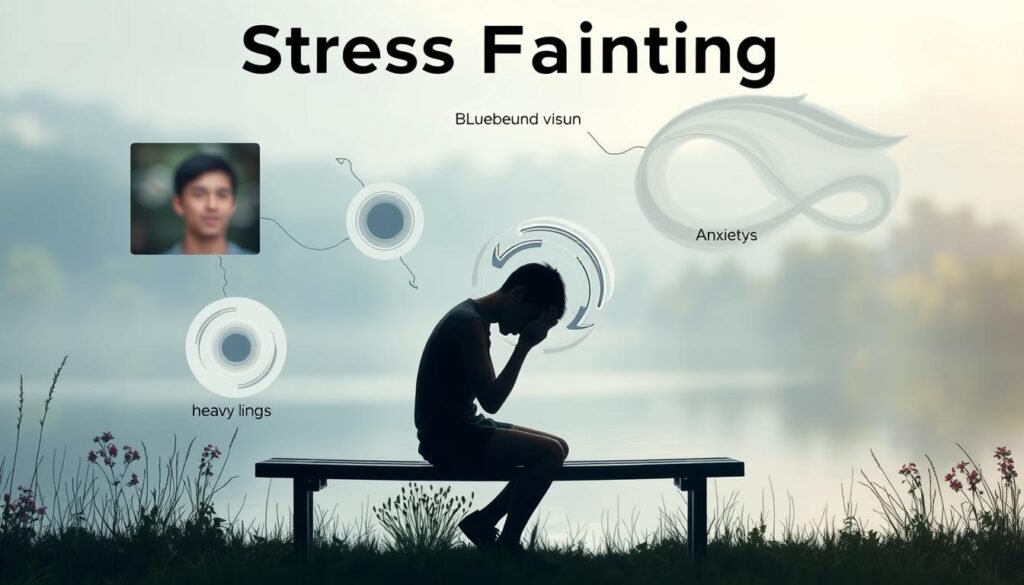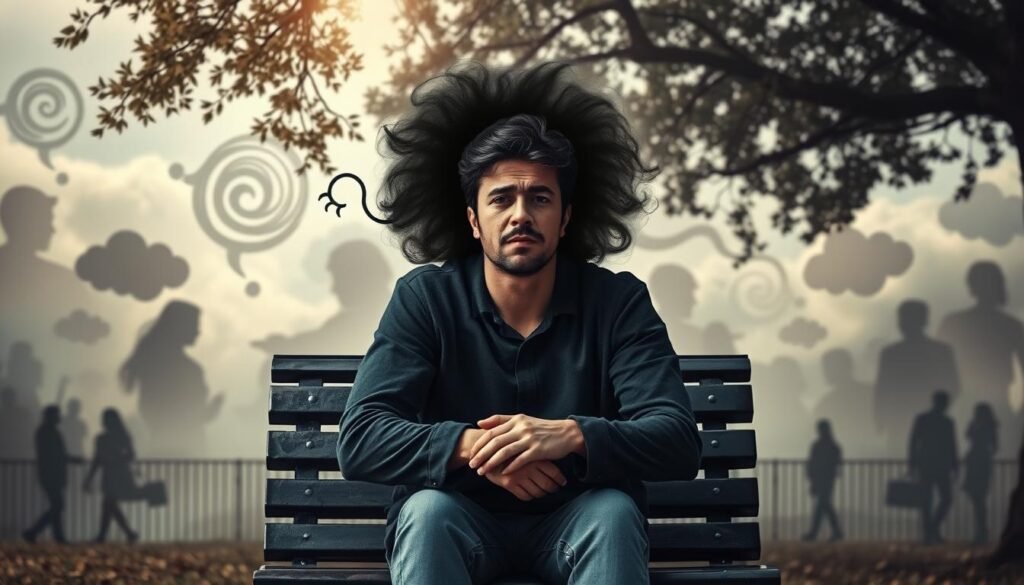Did you know hyperventilation can make up to 80% of anxious individuals feel faint? This fact highlights how common it is for anxiety to cause fainting. While fainting from anxiety is usually not harmful and doesn’t lead to lasting health problems, knowing the signs is key.
Those with anxiety might fear losing consciousness, especially during panic or phobia-driven situations. We’re talking about the close connection between anxiety and fainting here. Knowing the symptoms of anxiety-related episodes and when to see a doctor is vital. Being able to tell the difference between common fainting and that caused by anxiety helps people manage better.
Key Takeaways
- Hyperventilation is a common cause of fainting for individuals with anxiety.
- Anxiety-related fainting typically occurs in situations of intense panic or phobias.
- Only a fraction of individuals with anxiety seek treatment, despite its effectiveness.
- Fainting from anxiety is usually not dangerous and doesn’t lead to long-term health issues.
- Management strategies include controlled breathing and lifestyle adjustments.
The Connection Between Anxiety and Fainting
Anxiety can make the body react in physical ways. One such reaction is a higher chance of fainting during an anxiety attack. This creates a tough cycle. Fear of fainting can make anxiety worse, leading to more blackouts. Situational syncope happens because of certain stress-related situations. Many people might face it once in their life, due to intense stress or seeing blood.
When blood pressure drops suddenly, fainting can happen. Before this, people often feel symptoms like cramps, hard breathing, and dizziness. These signs can make anxiety even stronger, causing a feedback loop that’s hard to break.
To lower the risk of fainting from anxiety, you can try some tactics. For example, the isometric counterpressure maneuver. This involves tightening your muscles and crossing your legs. It can help keep your blood pressure stable. Drinking lots of water, about three liters a day, can also help.
It’s critical to know the signs and things that cause anxiety-related fainting. Getting to know how anxiety affects you physically can help you feel more in control. This knowledge can reduce the chances of anxiety attacks and fainting.
Common Symptoms of Anxiety Related Fainting
People with anxiety may notice different signs before they faint. Symptoms like light-headedness and feeling very vulnerable are common. It’s key to pay attention to your own symptoms as they vary by person.
Here are some usual symptoms of anxiety:
- Dizziness and light-headedness can make you think you’ll faint
- Rapid heartbeat, triggered by the body’s natural response to danger
- Shortness of breath from breathing too fast, lowering blood CO2
Being in crowded spots or on public transit can make anxiety worse. This might lead to blackouts. Health issues like low blood pressure or ear issues can add to this, making you worried about falling or being noticed.
Getting help for these symptoms is very important. To manage them, try to avoid caffeine, listen to soothing music, and work on breathing slowly, focusing on techniques like pranayama.
| Symptom | Description |
|---|---|
| Dizziness | Sensation of light-headedness that might cause fainting. |
| Rapid Heartbeat | Heart beats faster because of anxiety or panic, making you ready to act quickly. |
| Shortness of Breath | When it’s hard to breathe because of quick, shallow breaths. |
| Panic Attacks | Intense fear moments that may have physical signs like dizziness. |
| Environmental Triggers | Places that are too crowded or scary, raising anxiety and dizziness. |
Knowing these signs is key to handle anxiety that leads to fainting well. Being aware helps you deal with what you’re going through. It also makes finding the right help and support easier.
Understanding Hyperventilation and Fainting
Hyperventilation happens when you breathe quickly and shallowly, often because of anxiety. This quick breathing lowers the CO2 in your blood. This leads to changes in your body. Too little CO2 makes blood vessels narrow, cutting blood flow to the brain. This can make you feel dizzy or light-headed, like you’re going to faint.
What is Hyperventilation?
Hyperventilation is often set off by strong anxiety or stress. It happens when your body thinks it’s facing a threat, making you breathe faster. You might feel like you’re not getting enough air, which makes you breathe even faster. Many people don’t realize this fast breathing is a sign of anxiety.
How Hyperventilation Leads to Fainting
When hyperventilation reduces blood flow to the brain, you might feel lightheaded or faint. Before fainting, you may turn pale, see differently, or sweat. To avoid fainting, stay hydrated and lie down to help blood reach your brain. Avoid places that are too warm or crowded. If you faint often, especially with chest pain or a fast heartbeat, see a doctor. Knowing about hyperventilation can help you handle anxiety better. It teaches you the importance of breathing correctly to avoid fainting.
Knowing if your symptoms are from anxiety or something else is crucial.Understanding the difference between anxiety-induced symptoms and other conditions is key for the right treatment.
Can Anxiety Cause Fainting?
Can anxiety make you faint? People often ask this because of the physical symptoms anxiety can cause. While fainting is rare during panic attacks, feeling dizzy and unsteady isn’t. Panic attacks can make your blood pressure and heart rate go up. This means fainting is less likely to happen. Yet, for some, the feeling of fainting during a panic attack feels very real and scary.
Why does this happen? It’s all about hyperventilation when it comes to anxiety. During a panic attack, you might breathe too fast. This can lower the carbon dioxide in your body. That can make you feel lightheaded, almost like you’re going to faint. People with panic attacks often talk about feeling faint. But, this isn’t the same as true fainting caused by a sudden drop in blood pressure.

How can people with anxiety stop feeling like they’ll pass out? There are ways to help. Techniques like breathing slowly, relaxing your muscles, and changing how you think can help. Knowing what triggers your panic attacks is important too. For example, being scared of blood or needles can cause a specific type of fainting called vasovagal syncope. This is different from feeling dizzy because of anxiety.
So, can anxiety cause fainting? Yes, especially in extreme cases like hyperventilation or facing big fears. But, there are many treatments available. This includes talking therapies and medication. With the right help and support, managing fainting episodes is possible.
Exploring Anxiety Fainting Spells
People with anxiety fainting spells often feel lost and unsure. They might experience lightheadedness, weakness, and their vision may blur. Learning about the link between anxiety and dizziness is key to tackling these symptoms.
Symptoms Experienced During Fainting Spells
When someone is about to faint from anxiety, they might feel several things. They can feel disconnected, have trouble thinking clearly, suddenly feel weak, see poorly, or become acutely aware of their heartbeat.
Identifying Triggers for Anxiety Fainting Episodes
Knowing what triggers stress fainting is vital for prevention. Triggers can be:
- High-stress scenarios like speaking in public or taking tests.
- Places that are too hot or too crowded.
- Standing for too long, affecting blood flow.
- Experiencing intense fear or panic during an anxiety attack.
It’s important to understand how these triggers link to fainting. Learning about how to manage anxiety and dizziness can help. Techniques such as mindfulness, controlled breathing, and a healthy lifestyle can make a difference.
The Role of Vasovagal Syncope in Anxiety
Vasovagal syncope is key in understanding how some people faint because of anxiety. It’s the most common fainting type, often caused by stress or scary sights like blood. When it hits, one’s heart rate and blood pressure drop fast. This cuts down blood to the brain, causing a quick blackout. Knowing vasovagal syncope signs can really help someone understand what they’re going through.
What is Vasovagal Syncope?
This fainting happens when the nervous system, which controls heart rate and blood pressure, fails. Things like standing too long, being in the heat, or fear of getting hurt can trigger it. Over 85% of people under 40 who faint do so because of vasovagal syncope. It’s common in young people but older folks can get it too. Normally, a person comes around in about a minute, but how fast they bounce back varies.
How Vasovagal Syncope Relates to Anxiety
There’s a connection between vasovagal syncope and anxiety through common triggers that cause fainting. Anxiety can lead to fainting, which then makes the anxiety worse. It’s a tough cycle. People with anxiety or depression often feel their life quality is much lower. To handle it, learning about the condition, treatments without medicine, and sometimes cardiac pacing helps. Knowing the symptoms and triggers can make a big difference. To learn more, check this detailed resource.
Panic Attack Fainting: What You Need to Know
Panic attack fainting is rare but scary. Intense fear during a panic attack can cause various symptoms. These include dizziness and even fainting. Often, this is due to hyperventilation, which reduces oxygen flow. This can make you feel weak and lost.
It’s vital to know how panic attacks link to these physical reactions. Symptoms often are a fast heartbeat, chest pain, and feeling dizzy. If these get worse, you might faint. This can make people seek medical help.
It’s key to recognize a panic attack early. Using the 333 rule can help. Find three things you can see, hear, and touch. It helps shift your focus from the panic. Panic disorder means attacks happen more than once. The fear of the body’s reaction can create a cycle. This might lead to more fainting during panic attacks.
If panic attacks keep happening, it’s smart to get help. Talking to a doctor or therapist can offer new ways to cope. Techniques like cognitive behavioral therapy can be really helpful. To learn more about handling these episodes, check this informative read.
Signs of Stress Fainting and Its Physical Symptoms
Knowing how to spot stress fainting is essential for those prone to it. Early detection makes prevention possible. This condition shows itself through several physical signs. These signs signal the need for quick measures.
Recognizing Stress-Induced Fainting
Emotional stress often leads to fainting by affecting how the body reacts. You might notice:
- Dizziness: This warning could mean fainting is near.
- Lightheadedness: Feels like you’re not quite real.
- Rapid heart rate: Your body is gearing up for action.
- Paleness: Less blood flow makes skin look lighter.
- Visual disturbances: When it’s hard to see clearly.
Physical Signals to Monitor
It’s important to watch for certain symptoms to avoid fainting from stress. Look out for:
- Weakness or fatigue: When you suddenly feel too tired.
- Increased perspiration: Sweating a lot can mean stress is too high.
- Nausea or stomach discomfort: This may happen as anxiety goes up.
- Tingling sensations: Usually in the fingers or mouth area.
- Shaking or trembling: A clear sign of too much anxiety.

Anxiety Dizziness Fainting: The Overlap of Symptoms
Many people experience a mix of anxiety, dizziness, and fainting. Those with anxiety often feel dizzy, which can lead to fainting. This shows the need for better understanding and coping methods.
Panic disorders often come with dizziness and may cause blackouts. Knowing how these symptoms connect helps people find the right help. Studies show that many with dizziness also face anxiety or depression.
It’s important to learn about these experiences. Using coping skills and getting help can ease the fear of these symptoms. Techniques like breathing exercises and grounding techniques can help with emotional health.
Research suggests that dizziness might cause anxiety, leading to other issues. Teens, for example, might get irritable because of anxiety. In high-stress situations, understanding and managing these feelings is crucial.
Knowing more about anxiety, dizziness, and fainting helps people deal with them. If symptoms worry you, getting a medical check-up is vital. Sometimes, they signal other health problems.
| Symptoms | Anxiety Dizziness | Fainting |
|---|---|---|
| Feeling lightheaded | Common | Possible precursor |
| Palpitations | Common | |
| Sweating | Common | |
| Nausea | Possible | Possible |
| Weakness | Occasional | Common |
| Emotional distress | Common | Less likely |
Encouraging self-awareness helps manage anxiety and dizziness. Learning about these symptoms can greatly improve one’s life and mental health.
For more on managing anxiety and spotting recovery signs, look at this resource. It highlights the value of support and coping techniques.
When to Seek Medical Attention for Fainting
Knowing when to get help for fainting is key for health and safety. Fainting, or syncope, has many causes including anxiety. Anxiety attacks can indeed lead to fainting. This usually means a brief loss of consciousness. Spotting early signs is crucial for acting fast.
Before fainting, people might feel weak, dizzy, nauseous, and their vision may change. These signs can point to anxiety but also to dehydration, low blood pressure, or even heart attacks and strokes. Other symptoms to watch for include sweating, shortness of breath, and feelings of anxiety. These could mean it’s time to see a doctor.
If fainting happens out of the blue or keeps happening, it’s important to see a doctor. This is especially true for those with heart problems or if fainting comes with an irregular heartbeat or chest pain. In such situations, calling an ambulance is the safest option.
Here’s a table summarizing the important indicators for seeking medical help:
| Situation | Action Required |
|---|---|
| Fainting without a known cause | See a doctor |
| Repeated fainting episodes | Seek medical evaluation |
| Fainting with irregular heartbeat or chest pains | Call an ambulance |
| Fainting lasting more than a few minutes | Call 911 |
| Confusion, blurry vision after fainting | Get medical attention |
Staying informed about fainting reasons is important. It helps tell apart fainting from anxiety and real health crises. Keeping track of health and mental state can lower anxiety-induced fainting.

How to Manage Anxiety-Induced Fainting
Struggling with anxiety-induced fainting is tough, but there are ways to handle it. Learning to manage anxiety well can make a big difference. It keeps fainting at bay. Breathing techniques to prevent fainting are key to feeling better.
Breathing Techniques to Prevent Fainting
Breathing right can stop you from feeling too anxious and fainting. It helps you stay in control when anxious. Let’s look at some helpful techniques:
- Diaphragmatic Breathing: Breathe in deeply through your nose, let your belly fill up, then breathe out slowly. It calms and stabilizes you.
- 4-7-8 Technique: Inhale for a count of four, hold it for seven, then exhale for eight. This pattern helps lessen anxiety and avoids fainting.
- Pursed-Lip Breathing: Breathe in through your nose with lips pursed, then exhale slowly. It helps control your breath.
Long-Term Strategies for Managing Anxiety
Dealing with anxiety in the long run means looking at the big picture. This includes therapy, changing your lifestyle, and medication if needed. Here are some tips:
- Regular Exercise: Staying active helps lower stress and improves mood, making anxiety easier to handle.
- Therapy Options: Talking to a therapist offers new ways to deal with anxiety. They help find the cause.
- Healthy Lifestyle Choices: Eating well, drinking enough water, and getting good sleep are essential for emotional health.
- Mindfulness and Meditation: Being mindful and meditating brings calmness and reduces anxiety.
Using these breathing techniques to prevent fainting and longer-term methods, you can take charge of your anxiety. Knowing how to spot early signs of trouble and what to do can give you confidence.
Conclusion
The link between feeling extremely anxious and fainting is crucial to understand for those affected. Knowing how these fainting spells come about is key to handle them better in daily life. Panic attacks can cause blood pressure to fall quickly. This can lead to fainting because of vasovagal syncope.
Noticing signs like feeling dizzy or light-headed early on can help someone act before fainting happens.
Though fainting from anxiety can be scary, there are many ways to find relief. Cognitive-behavioral therapy (CBT) helps a lot with panic and anxiety. Making small changes in daily habits, like regular exercise or mindfulness, also helps lessen these spells.
Having a plan to deal with anxiety, including how to breathe right, can make people feel more in control and happier. It’s important to talk to a doctor if the anxiety and its symptoms get too hard to handle. By knowing more and taking steps to manage symptoms, individuals can face their anxiety confidently. This makes these challenges something they can handle.